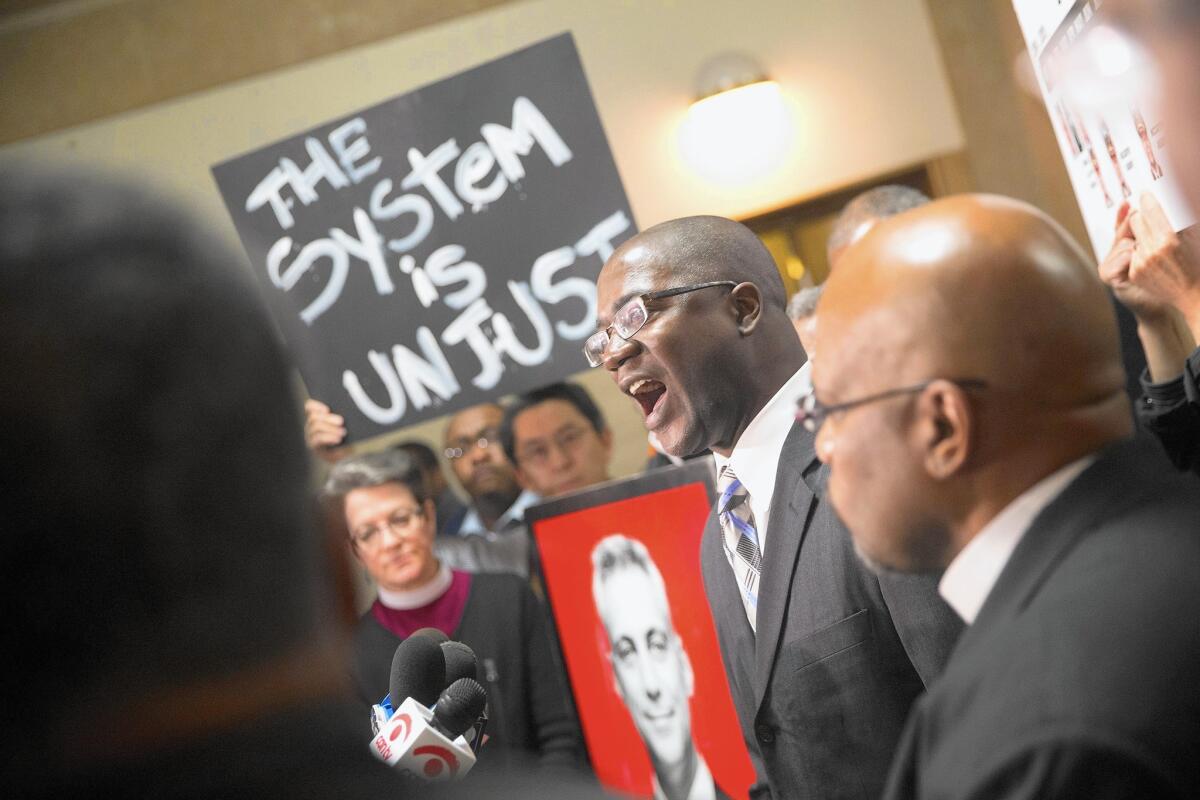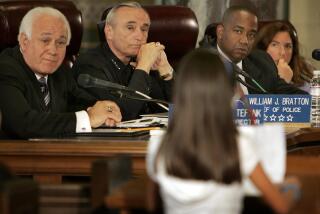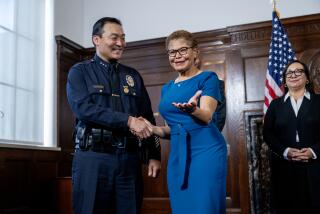Next Chicago police chief faces daunting mission, and demanding boss in Rahm Emanuel

Demonstrators protest outside Chicago Mayor Rahm Emanuel’s office Dec. 1 after he announced the firing of Police Supt. Garry McCarthy.
Heal a deep lack of public trust. Cooperate with a federal civil rights investigation into the use of force. Reform a police department with a history of corruption. Deal with some of the nation’s most intractable gun and gang problems. And work for a famously demanding mayor in the midst of his most severe crisis.
It’s a daunting to-do list for Chicago’s next police superintendent, a person Mayor Rahm Emanuel will hire to navigate the turbulent environment that has erupted since the court-ordered release of a video showing a white police officer shooting a black teenager to death more than a year ago.
Law enforcement experts say the new top cop should have a strong personality, understand police work and its dangerous nature, and recognize past abuses. And if Chicago is to realize true change, they say, it’s important that the person have a large measure of independence from the mayor — or at least be working on the same reform goals — and the freedom to make decisions without political influence.
But relinquishing such authority to a strong-willed police superintendent could be difficult for Emanuel, who is known for hands-on governing and asserting tight control over many facets of city government. That includes calling Cabinet members and other top aides at all hours to question decisions, demand plans and express displeasure.
Garry McCarthy was no exception.
Chicago’s former police superintendent received frequent phone calls from Emanuel, who micromanaged police headquarters from his suite of City Hall offices, sources familiar with McCarthy’s tenure said. McCarthy also had to deal with what was described as Emanuel’s approach of governing day to day and crisis to crisis and his lack of a broader vision of how to fight and prevent crime, the sources said.
Two senior Emanuel administration officials acknowledged that the mayor calls his top deputies often, but they challenged the assertion that he micromanages the Police Department.
“When you have some of the things that have gone on — kids and babies getting shot — the mayor wants to know what the plan is to address it, and you’re going to get calls from him at 2 in the morning. It’s an enormously stressful job,” said one of the Emanuel aides, who was not authorized to speak publicly. “It’s not about telling [the police superintendent] what to do.... The mayor gave Garry a pretty high level of deference, but you work for Rahm, so you’re going to have to pick up the phone.”
Emanuel’s decision to publicly back McCarthy early during the Laquan McDonald shooting controversy only to fire him days later in the glare of the national spotlight could leave some candidates hesitant to apply for the job.
Emanuel aides say concerns should be outweighed by the chance to reform one of the nation’s largest departments with the help of a federal civil rights investigation.
“This is a huge opportunity at this moment in time. The Department of Justice investigation will give the new leader a lot of cover to do things that he or she would not otherwise be able to do, because of internal and external politics,” said the Emanuel aide. “It is an exciting opportunity to be able to come in and hit the reset button in Chicago and get a lot accomplished.”
City Alderman Howard Brookins, who has worked as a public defender and assistant state’s attorney, says City Hall has long had a heavy hand in the Chicago Police Department. That tradition, he says, will have to change.
“The next person needs to be a strong leader who has the ability to get the job done,” Brookins said. “And whether or not that person will have free rein from the mayor to get in there and fix the problems will be the key.”
Emanuel fired McCarthy on Dec. 1 in the midst of the fallout from the police shooting of McDonald, 17, in October 2014. The mayor and City Council signed off on a $5-million settlement for McDonald’s family in April, just after Emanuel won reelection.
For nearly a year, Emanuel fought to keep a police video of the shooting under wraps. Hours before a video was released in November showing Officer Jason Van Dyke shooting McDonald as the teen walked away and then as he lay in the street, prosecutors charged the officer with murder. On Tuesday, Van Dyke, 37, pleaded not guilty to first-degree murder.
The timeline has led some Chicagoans to take to the streets in protest, accusing Emanuel and Cook County State’s Atty. Anita Alvarez of being complicit in a cover-up. The subsequent release of city records revealed six officers at the scene of the shooting, including Van Dyke, filed reports saying McDonald had approached officers before he was shot, though he actually walked away.
The McDonald case and Emanuel’s public acknowledgment that a “code of silence” exists in the Police Department when it comes to misconduct do not mark the first time a Chicago mayor has had to search for a new leader to restore confidence in a department mired in controversy.
In 1960, when then-Mayor Richard J. Daley was left searching for a reformer after a scandal, he made what even decades later seems like a radical move. He tapped criminologist O.W. Wilson, a dean at UC Berkeley, for the job. At the time, Wilson’s scholarly background was criticized as not steeped enough in policing to address the misconduct, which had come to light when eight officers were named in a burglary ring.
See more of our top stories on Facebook >>
Wilson ran the Chicago Police Department for seven years until he retired, and eventually was credited with an overhaul that included improving morale, upgrading equipment, boosting rank-and-file pay and increasing personnel.
His October 1972 Chicago Tribune obituary outlining the changes reads like a blueprint for what the city might again have in store today.
“New young faces began appearing in high places in the department, and outside consultants became a common sight. They were brought in to spot things that needed correcting,” the obituary said. “Most important, Wilson obtained the complete backing of Mayor Daley.”
It continued: “However, Wilson was not without his critics.”
“In addition to the usual sniping from the City Council, many of the policemen who had risen through the ranks under the old system” had “suddenly found themselves purged” and offered “attacks that became personal.”
ALSO
Venice tenants complained to the city, then wished they hadn’t
Are SeaWorld’s whales better off staying in their glass-and-concrete enclosures?
Will this year’s Academy Awards see a repeat of #OscarsSoWhite backlash?
More to Read
Start your day right
Sign up for Essential California for news, features and recommendations from the L.A. Times and beyond in your inbox six days a week.
You may occasionally receive promotional content from the Los Angeles Times.






